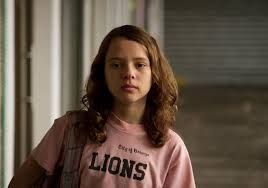
You can’t watch Princess, director Tali Shalom-Ezer’s film, taking it literally. Ostensibly it is the story of a twelve year old girl, Adar (Shira Haas), sometimes called Adari, encountering puberty in the house of her mother, Alma (Keren Mor) and her boyfriend, Michael (Ori Pfeffer). Mother is a doctor and nominal step father is a teacher. This is a household where Adar’s absence from school isn’t challenged, rather worked through. Alma’s main concern is that Adar isn’t expelled. To this end, she flirts with a school official. ‘They can’t expel you, you’re too talented,’ Alma reassures her daughter. She has no predilection for reinforcing boundaries.
This is a film that opens in bed, with Alma waking Adar up with glowing praise. The disturbing thing is that Adar is lying next to Michael, who is not very focussed on preserving boundaries either. Adar, an only child, is too old to be crawling into her mother’s bed. She does so because she can – they are in adjoining rooms.
The realm in which the film works is entirely based around child psychology. On screen, we see Adar, on one of her days off school (there are many) standing on top of a building and seeing an androgynous boy, Alan (Adar Zohar-Hanetz) play-fighting with an older boy. She could be looking at herself. Adar introduces herself to Alan and takes him shopping – they buy two t-shirts so they look identical in their shorts – and then, after she is picked up at night by Alma and Michael, home. Adar asks if Alan can sleep in her room, this immediately after she has had her first period; Alma’s response to Adar’s first experience of menstruation is to give her money for a blouse. As the audience, we are shocked that Alma and Michael agree to this arrangement – truly they are taking permissive parenting to a whole new level.
Michael and Alma have an active sex life. It is not gratified by children; Adar tells Alan that Michael has a problem: he is sterile. We interpret his behaviour as a response to sterility – an extreme one. At one point, Michael takes Alan to the site of an old drive-in, where homosexual couples copulate freely. It is an Israeli equivalent of Hampstead Heath. We understand that Alan’s friend, the one with whom he play-fought, is a rent boy, seen by Adar leaving a street corner with a much older man.
Alan asks Adar if he can borrow 200 shekels. Adar takes him to the money drawer and asks him to restrict his withdrawals to 50 shekels a day. She never asks what the money is for. Michael loses his job and is a stay-at-home step dad – but doesn’t tell Alma. He cooks meals, watches cartoons with Adar and play-fights with her as the angry teacher against whom Adar strikes back. These scenes are disturbing to watch because we are never sure where they might lead.
As we watch Michael with Alan, painting him, asking him to call him ‘Daddy’ (ooh, creepy) we start imagining that Alan isn’t real and that Michael is really talking to and painting Adar, the child he refers to as ‘prince’. After an entertaining scene in which Adar and Alan blow spit bubbles – I learnt something new - we see Adar and Alan simulate sex in their room (what fully clothing athleticism) and the film builds to an inappropriate assumption of intimacy between Michael and Alan.
Alan has long hair and could be mistaken for a girl. He doesn’t talk about his mother at all; he mentions his father fleetingly. ‘He took on three men,’ he says admiringly. Michael’s focus on Alan prompts Adar to seek out her own father, who makes her a gift of avocados – he tells her how to store them, two in newspapers, the rest in the fridge. After Alan is instructed to take Adar to school, she is motivated to come in at 7:00am as punishment. Her effort lasts a day.
Towards the end, Adar visits her mother’s work place and waits for her. Alma is angry. It is clear that Adar is desperate for boundaries. In the final scene, Adar, who wears her bag one strap off her shoulder – her father insists that she fixes it – uses Alan’s flick knife to cut a sandwich and heads for school. The school bell sounds, ‘twinkle, twinkle little star’ as she joins the enthusiastic throng.
Articles on permissive parenting tell us that it does not mean that the parents don’t care; rather they care too much. But children need guidance, structure and routine. At no point, does anyone say ‘no’ to Adar – by contrast Alan says ‘no’ to Michael. The effect of this is for her to seek answers inward.
Can a child verging on adolescence do this? The school ending suggests not, reminding us why we do need education to stimulate thought.

Reviewed at the London Jewish Film Festival, Barbican Centre, Saturday 14 November 2015, 20:35 screening



